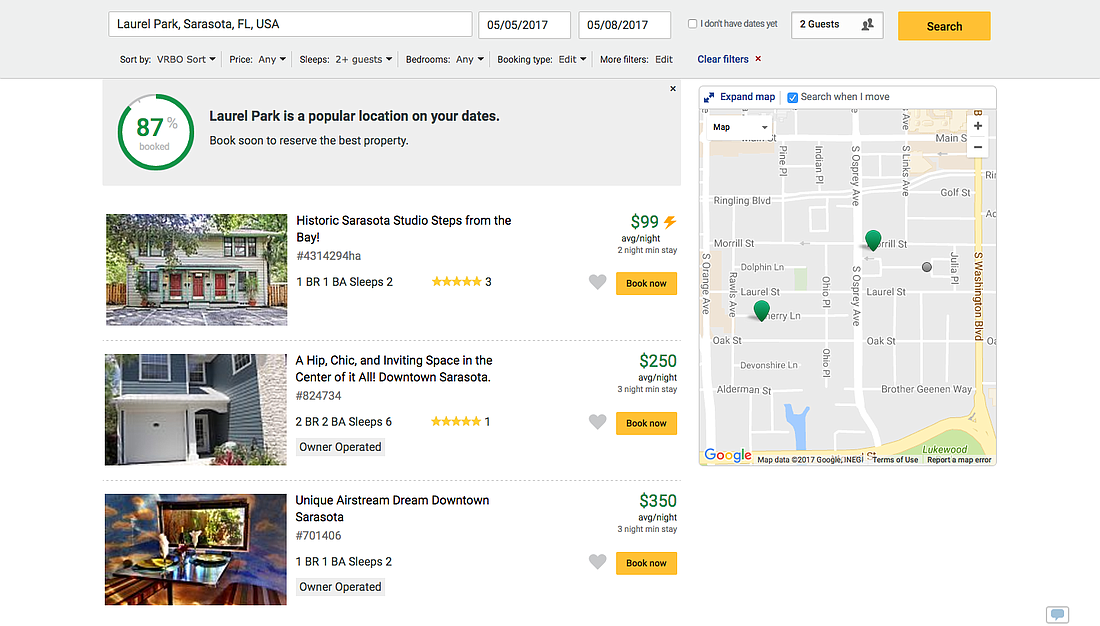- April 27, 2024
-
-
Loading

Loading

Browsing VRBO.com for vacation-rental properties in Sarasota last month, Deborah Dart found a number of charming homes marketed in the Laurel Park neighborhood.
For a visitor, staying in a house in Laurel Park — right next to downtown and a short walk to the bayfront — might be an ideal arrangement during a trip to the city.
For Dart, a year-round Laurel Park resident, the listings were more concerning. She appreciates the eclectic character of the neighborhood, but the short-term vacation rentals come with some negative side effects.
“You’re faced with people who don’t know where to park, what the codes in Sarasota are, where to put the garbage,” Dart said.
As sharing-economy services such as Airbnb increase in popularity, residential areas across the country have grappled with the issue. For Dart, the inconveniences she described are secondary to a bigger question about how the rentals can reshape a neighborhood.
If short-term rentals are more lucrative than long-term rentals, lower income residents can get forced out. Dart said she sees fewer full-time residents in the neighborhood than she used to.
“Places can stay vacant all summer long or for months, because the owners taking advantage of this short-term rental period have made all their money for a few months and don’t really care if they’re renting full time,” Dart said. “It tends to change the dynamics of a neighborhood. I don’t think it’s particularly healthy.”
“It tends to change the dynamics of a neighborhood. I don’t think it’s particularly healthy.” — Deborah Dart
City regulations prohibit short-term rentals in residential areas. Rentals in those neighborhoods are required to have a minimum stay of eight days.
Dart doesn’t think property owners are nefariously renting houses for shorter periods. When she reached out to the city regarding this issue in August, staff took action and she saw a downtick in improperly listed properties. Over time, though, the rule-breakers have built up again.
“I think it’s a problem that requires kind of a continuing follow-up, because there are always new owners,” Dart said. “Who would know that code even exists?”
In August, city staff took a proactive approach. Tim Litchet, director of Neighborhood and Development Services, said the city’s mortgage foreclosure specialist would be handling illegal rental cases going forward. At the time, he described nightly rentals as something “we perceive could become an ongoing issue.”
Lawrence Burleson, the city’s code compliance supervisor, said the city is usually able to bring owners into compliance just by sending a letter informing them of the regulations. If a property owner refuses to comply, a special magistrate can issue daily fines until the situation is rectified.
“We don’t have the manpower to check everything, but we’ve had very good cooperation from the property owners.” — Lawrence Burleson
Staff doesn’t scour the internet for vacation properties that only have a six-night minimum stay, but when a resident lets the city know about an illegal rental, action is taken.
“Right now, we’re responding strictly on a complaint basis,” Burleson said. “We don’t have the manpower to check everything, but we’ve had very good cooperation from the property owners.”
Dart understands enforcement poses a challenge for the city, and she’s hopeful staff will take meaningful steps to address any future issues that pop up. The listing websites don’t mandate a minimum stay for residential properties, so she believes any change will have to come from the property owners themselves.
“I don’t think the companies like VRBO really care, nor can the city really regulate those companies,” Dart said. “The city needs to go educate the owners. I believe they’re going to do this.”